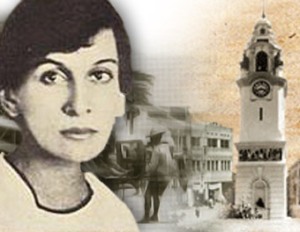 Sybil Medan Kathigasu (née Daly) GM (3rd September 1899 - 12th June 1948) was a Malayan Eurasian nurse who supported the resistance during the Japanese occupation of Malaya. She was the only Malayan woman to be ever awarded with the George Medal for bravery. Sybil Medan Kathigasu was born Sybil Medan Daly to an Irish-Eurasian planter (Joseph Daly) and a French-Eurasian midwife (Beatrice Matilda Daly née Martin) on 3 September 1899 in Medan, Sumatra, Indonesia.
Sybil Medan Kathigasu (née Daly) GM (3rd September 1899 - 12th June 1948) was a Malayan Eurasian nurse who supported the resistance during the Japanese occupation of Malaya. She was the only Malayan woman to be ever awarded with the George Medal for bravery. Sybil Medan Kathigasu was born Sybil Medan Daly to an Irish-Eurasian planter (Joseph Daly) and a French-Eurasian midwife (Beatrice Matilda Daly née Martin) on 3 September 1899 in Medan, Sumatra, Indonesia. Her middle name reflects her birthplace, Medan. Her paternal grandparents were an Irishman and a Eurasian woman while her maternal grandparents were a Frenchman (Pierre Louie Martin) and a Eurasian woman (Evelyn Adeline Martin née Morrett). She was the fifth child and the only girl. She was trained as a nurse and midwife and spoke Cantonese fluently. She and her husband, Dr. Abdon Clement (A.C.) Kathigasu, operated a clinic at No. 141, Brewster Road (now Jalan Sultan Idris Shah) in Ipoh from 1926 until the Japanese invasion of Malaya.
The family escaped to the nearby town of Papan days before Japanese forces occupied Ipoh. The local Chinese community fondly remembered Dr. A.C. Kathigasu and gave him a Hakka nickname "You Loy-De". Residing at No. 74, Main Street in Papan, the Kathigasus secretly kept shortwave radio sets and listened to BBC broadcasts. They quietly supplied medicines, medical services and information to the resistance forces until they were arrested in 1943. Despite being interrogated and tortured by the Japanese military police, Sybil persisted in her efforts and was thrown in Batu Gajah jail. After Malaya was liberated from the Japanese in August 1945, Sybil was flown to Britain for medical treatment. There, she began writing her memoirs. Sybil received the George Medal for Gallantry several months before her death on 12 June 1948.
Sybil's husband was Dr. Arumugam Kanapathi Pillay, a Ceylonese (now Sri Lankan) Tamil from Taiping. He was born on 17 June 1892 in Taiping to Kanapathi Pillay and Thangam. He married Sybil in St. John's church (now cathedral) in Bukit Nanas, Kuala Lumpur. Initially there had been a religious objection from her parents as he was a Hindu and she was a Catholic. However, with agreement from his father, the wedding took place after he changed his name from Arumugam Kanapathi Pillay to Abdon Clement Kathigasu. They were married on 7 January 1919 in St John’s Church, Bukit Nanas, Kuala Lumpur. Sybil's first child was a son born on 26 August 1919, but due to major problems at birth, died after only 19 hours. He was named Michael after Sybil's elder brother who was born in Taiping on 12 November 1892 and was killed in Gallipoli on 10 July 1915 as a member of the British Army.
The devastating blow of baby Michael's death led to Sybil's mother suggesting that a young boy, William Pillay, born 25 October 1918, who she had delivered and had remained staying with them at their Pudu house, should be adopted by Sybil and her husband. Then a daughter, Olga, was born to Sybil in Pekeliling, Kuala Lumpur, on 26 February 1921. The earlier sudden death of baby Michael made Olga a very special baby to Sybil, when she was born without problems. So when Sybil returned to Ipoh on 7 April 1921, it was not only with Olga, but also with William and her mother who had agreed to stay in Ipoh with the family. A second daughter, Dawn, was born in Ipoh on 21 September 1936.
Sybil died on 12 June 1948 aged 48 in Britain and her body was buried in Lanark, Scotland. Her body was later returned in 1949 to Ipoh and reburied at the Roman Catholic cemetery beside St. Michael's Church opposite the Main Convent of the Holy Infant Jesus (now SMK Convent) on Brewster Road (now Jalan Sultan Idris Shah) in Ipoh. A road in Fair Park, Ipoh was named after Sybil (Jalan Sybil Kathigasu) after independence to commemorate her bravery. Today, the shop house at No. 74, Main Road, Papan, serves as a memorial to Sybil and her effortnes.